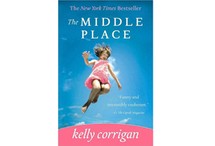The Middle Place
By Kelly Corrigan
272 pages;
Voice
It's the first best conversation, the one you have with your eyes and hands and heart, straight from the cradle. If you're lucky, that too-deep-for-words conversation with your parents goes on for decades. But sooner or later it ends, and that is totally not okay with Kelly Corrigan, whose funny, scary, irresistibly exuberant new memoir, The Middle Place (Voice), grabs the reader by the lapels and says, hey, we need to talk about this! Corrigan's dad, a sunny, gregarious love bug nicknamed Greenie, a man with a genius for "making people feel irreplaceable," convinced her that "the world was beyond safe-it had a sense of humor, it knew your name, and it was waiting for you. Hell, it was even rooting for you," she writes. So when she got a terrifying diagnosis of late-stage breast cancer at age 36, she called in the troops: her "full-service" husband, Edward, a gentle voice of sanity; the ebullient Greenie, of course; her "lionheart" mother, Mary, an eager surrogate lap for the couple's tiny daughters; and an army of relatives and friends. But then, toward the end of her chemo treatments, came another kick in the teeth: Greenie had a recurrence of the bladder cancer that had surfaced years before. The prognosis was dreadful. Greenie was upbeat as usual. And Corrigan suddenly realized, she says now, that she was in a very strange place in her life, trying to be both mother and daughter, spending her days "online at the Bladder Cancer WebCafè, writing e-mails to doctors, instead of being in the kitchen with my kids." Without realizing it, she had crossed over into what she calls "the middle place": the place where "a marriage license, a notarized deed, two birth certificates, and seven years of tax returns" prove you're an adult, yet all you want to do is pick up the phone and get Mom or Dad on the line.
"When he got sick this last time," she says, "it was the first time I realized that there will be a day when I will not be able to call him. I will not be able to hear his voice. And I just didn't see that coming. Isn't that crazy?" A hard thing, growing up-even if you're 40 and counting. But nobody really talks about it. They act as if the loss of an aged parent (the event Corrigan dreads) would be negligible: "People say, 'I heard your mom died, I'm so sorry, how old was she?' And you say, 'She was 80,' and then they say, 'Well, God bless her.' You're just supposed to get over the fact that you don't have a parent in the world anymore. And if you get breast cancer, you don't have anybody to call." Her survival strategy: Open up the phone lines. "My biggest hope for this book is that it starts a conversation about what it means to be a grown-up and live in a world where you're no longer someone's daughter." She admits that she hasn't fully "leaned into motherhood," that she's still a kid at heart. "Being a kid," she says, her voice dropping to a confidential whisper, "is such a luxury!" But with her parents living on the other side of the continent (they're just outside Philadelphia, she's near San Francisco), Corrigan has learned what a godsend friends can be. "I really believe in the role of women in women's lives," she says. Her Web site, circusofcancer.org , tells women what to say, what to do for their friends with cancer. With her own disease behind her for now, and Greenie, amazingly, bucking the odds, Corrigan is calling out to the world. Luckily, she's outgoing, because "this is a job for an extrovert." Or, as Greenie would say, "Lovey, that's great! Let's do it!"
— Cathleen Medwick


